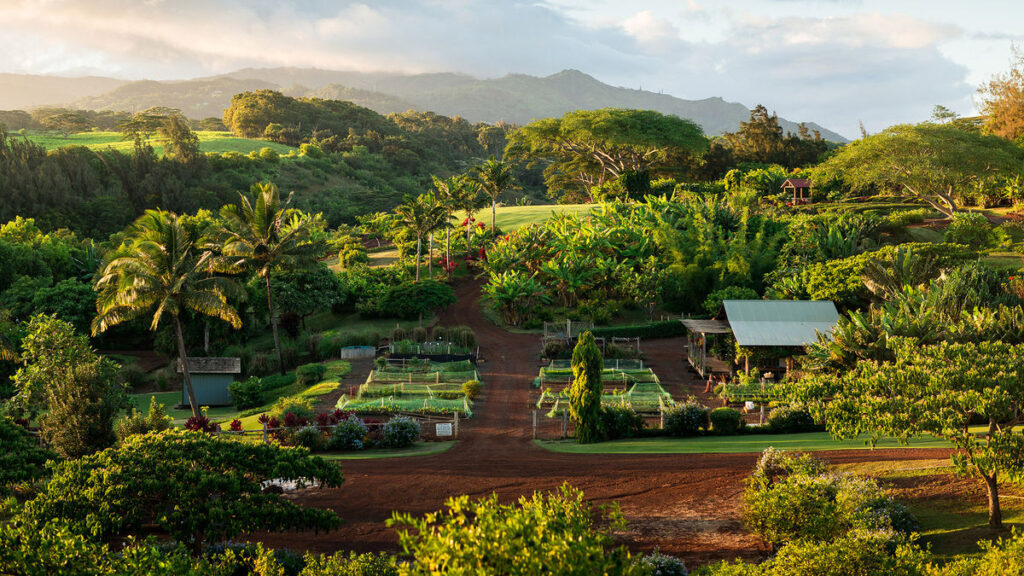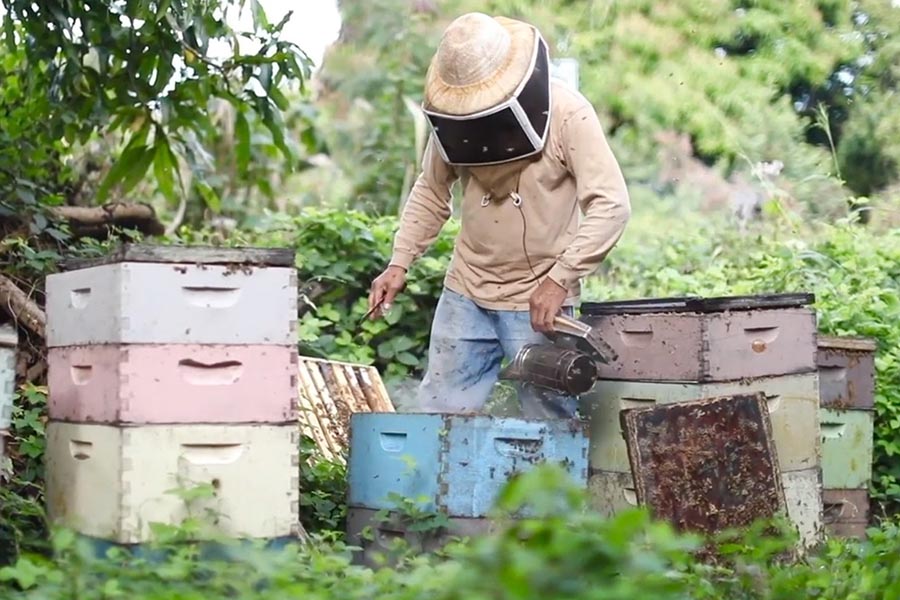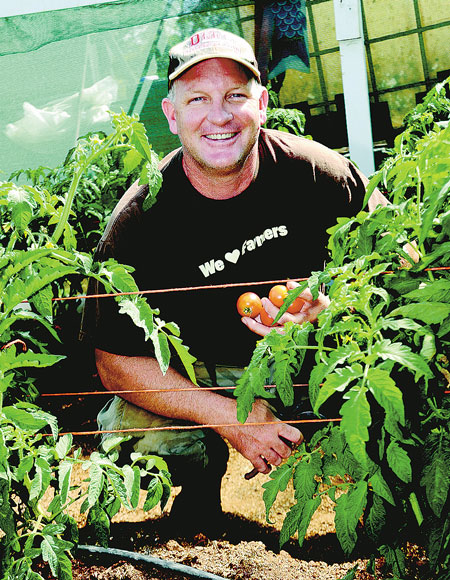Imagine embarking on a journey through the enchanting landscapes of Hawaii, where vibrant fields of fruit orchards and lush green farmland beckon you to explore. Experience the unique fusion of agriculture and tourism, as visitors from around the world immerse themselves in the thriving agritourism scene of Hawaii. Discover the rich history and culture behind the growth of agritourism in this tropical paradise, where farmers open their gates, sharing their knowledge and bounty, leaving you with an unforgettable taste of Hawaii’s vibrant agricultural heritage.

Hawaii’s Agritourism Industry
Hawaii’s agritourism industry has been steadily growing in recent years, offering both locals and tourists the opportunity to experience the unique blend of agriculture and tourism that the islands have to offer. With its fertile lands, diverse agricultural products, and stunning natural beauty, Hawaii provides an ideal setting for agritourism activities. From visiting farms and orchards to indulging in farm-to-table dining experiences, agritourism in Hawaii showcases the abundance of the islands’ agriculture while promoting sustainable practices.
Overview of Agritourism in Hawaii
Agritourism, also known as farm tourism, is a form of tourism that involves visiting and engaging in agricultural activities. In Hawaii, agritourism encompasses a variety of experiences, such as farm tours, farm stays, food and wine festivals, and farm-to-table dining. It allows visitors to get a firsthand glimpse into the inner workings of Hawaii’s agriculture industry, fostering a deeper appreciation for local food, culture, and sustainable farming practices.
The Growth of Agritourism in Recent Years
The agritourism industry in Hawaii has seen substantial growth in recent years, as more people seek authentic and immersive travel experiences. With the rise of the farm-to-table movement and the increasing demand for locally sourced products, agritourism has become a significant economic driver for farmers and rural communities across the Hawaiian islands. This growth can be attributed to the increasing awareness of sustainable farming practices, the desire for unique and educational experiences, and the growing interest in supporting local agriculture.
Key Players in the Agritourism Industry
Several organizations and businesses play a vital role in Hawaii’s agritourism industry. The Hawaii AgriTourism Association (HATA) serves as a central hub for farmers, tour operators, and individuals involved in agritourism. HATA provides resources, education, and networking opportunities to support and promote the development of agritourism in Hawaii. Furthermore, various farms, ranches, and agricultural organizations actively engage in agritourism, offering a range of experiences to visitors. These key players collaborate to create a vibrant and sustainable agritourism industry in Hawaii.
Types of Agritourism Activities in Hawaii
Hawaii offers a diverse range of agritourism activities, ensuring that there is something for everyone interested in exploring the islands’ agricultural heritage. From farm tours and stays to farm-to-table experiences and food and wine festivals, visitors can immerse themselves in the beauty and bounty of Hawaii’s farms and culinary culture.
Farm Tours and Farm Stays
Farm tours provide an opportunity for visitors to explore the intricacies of local agriculture. Whether it’s coffee farms on the slopes of the Big Island, tropical fruit orchards in Maui, or pineapple plantations on Oahu, farm tours allow guests to learn about the cultivation, harvesting, and processing of various crops. Some farms even offer farm stays, allowing guests to experience a day in the life of a farmer by participating in hands-on activities and staying overnight on the farm.
Farm-to-Table Experiences
Hawaii’s farm-to-table movement has gained significant momentum in recent years, with many restaurants focusing on serving dishes made with locally sourced ingredients. Farm-to-table experiences give visitors the chance to taste the freshest produce and flavors that the islands have to offer. Whether it’s indulging in a farm-to-table meal at a renowned restaurant or participating in a culinary tour that highlights local ingredients, these experiences connect visitors with the agricultural roots of Hawaii’s culinary scene.
Food and Wine Festivals
Food and wine festivals provide a vibrant platform for showcasing Hawaii’s agricultural products and culinary talents. These festivals not only offer opportunities to savor a variety of local food and beverages but also celebrate the cultural heritage of the islands. From the Hawaii Food and Wine Festival, featuring internationally acclaimed chefs and local farmers, to the Kona Coffee Festival, dedicated to the beloved local coffee, these events give visitors a chance to experience the rich flavors and diversity of Hawaii’s agritourism offerings.
Popular Agritourism Destinations in Hawaii
Hawaii’s agritourism activities are spread across the major islands, each offering its own unique agricultural experiences and attractions. Hawaii Island, Maui, and Oahu stand out as popular agritourism destinations, showcasing the diverse agriculture and natural beauty that make the Hawaiian islands a haven for agritourists.
Hawaii Island
Hawaii Island, also known as the Big Island, is renowned for its agricultural diversity. Visitors to this island can explore coffee farms in the Kona region, known for its world-famous Kona coffee. The slopes of Mauna Kea and Mauna Loa are adorned with macadamia nut farms, where visitors can learn about the cultivation and processing of these delicious nuts. Additionally, the island boasts tropical fruit orchards, where guests can taste exotic fruits like papaya, guava, and lychee, fresh off the tree.
Maui
Maui offers a variety of agritourism experiences, making it a must-visit destination for agriculture and nature enthusiasts. The island is famous for its pineapple plantations, where visitors can take guided tours to learn about the history and cultivation of this sweet tropical fruit. Additionally, Maui is home to lavender farms and fragrant gardens, where visitors can immerse themselves in the enchanting scents and beautiful landscapes. Upcountry Maui, with its lush green fields, is also a hotspot for agricultural tours, showcasing the island’s diverse crops, including coffee, persimmons, and avocados.
Oahu
Oahu, the most populous island in Hawaii, offers its own unique agritourism experiences. Visitors can explore pineapple plantations, such as the Dole Plantation, where they can take train tours, sample fresh pineapple, and learn about the island’s pineapple heritage. Oahu is also known for its shrimp farms, such as Kahuku Farms, where visitors can discover the sustainable practices behind these tasty crustaceans. Furthermore, aquaponics, a sustainable farming method that combines fish and plant cultivation, is showcased at various locations on the island, offering a fascinating glimpse into innovative agricultural practices.
Agritourism Experiences on Hawaii Island
Hawaii Island is a treasure trove of agritourism experiences, allowing visitors to delve into the unique agricultural practices and products that thrive on the island.
Visiting Coffee Farms
Hawaii Island’s Kona region is famous for its coffee production, and visiting coffee farms is a popular agritourism activity on the island. Visitors have the opportunity to learn about the intricate process of growing, harvesting, and processing coffee beans. They can witness the meticulous hand-picking of ripe cherries and the traditional sun-drying methods that contribute to the exceptional flavor of Kona coffee. Some coffee farms offer guided tours, allowing visitors to walk through the coffee plantations, taste different coffee varieties, and gain a deeper understanding of the art of coffee cultivation.
Exploring Tropical Fruit Orchards
Tropical fruit orchards are another highlight of agritourism on Hawaii Island. With its favorable climate and fertile soil, the island yields a variety of exotic fruits. Visitors can embark on guided tours through orchards, where they can admire vibrant fruit-laden trees and taste freshly picked fruits. Guava, papaya, mango, and lychee are just a few of the fruits that guests can savor while learning about their cultivation and nutritional benefits. Exploring tropical fruit orchards provides a truly immersive experience into the flavors and aromas that define Hawaii’s agricultural abundance.
Learning about Honey Production
Hawaii Island is also known for its vibrant honey production. Visitors can learn about the beekeeping process and gain insight into the crucial role bees play in pollinating the island’s diverse flora. Guided tours at apiaries reveal the secrets of beekeeping, including the intricacies of hive management, honey extraction, and the various types of honey produced on the island. Guests can also sample different varieties of honey, each with its own unique flavor profile, ranging from delicate floral notes to rich and robust flavors.

Agritourism Experiences in Maui
Maui’s agricultural landscape offers visitors a wide array of agritourism experiences, showcasing the island’s rich farming traditions and diverse crops.
Maui Pineapple Tours
Pineapple plantations are synonymous with Maui’s agritourism offerings. Visitors have the opportunity to take guided tours of Maui’s pineapple farms, where they can learn about the history, cultivation, and harvest techniques of this tropical fruit. These tours often include educational presentations, tractor rides through the fields, and pineapple tasting sessions. Tourists can also discover the unique flavor profiles of different pineapple varieties and even try their hand at harvesting pineapples, providing an authentic and hands-on experience.
Lavender Farms and Fragrant Gardens
Maui’s lavender farms and fragrant gardens offer a tranquil escape into a world of captivating scents and breathtaking vistas. Nestled amidst rolling hills, these farms and gardens showcase a stunning variety of lavender species, as well as other aromatic flowers and herbs. Visitors can wander through the lavender fields, learning about the different varieties and their uses in both culinary and wellness applications. The fragrant gardens serve as an idyllic setting for picnics and special events, allowing visitors to immerse themselves in the serene beauty of these blooming landscapes.
Agricultural Tours in Upcountry Maui
Upcountry Maui is a haven for agriculture and offers a plethora of agritourism opportunities. Visitors can embark on agricultural tours that take them through the lush green fields and picturesque landscapes of the region. These tours showcase the diverse crops grown in Upcountry Maui, such as coffee, macadamia nuts, persimmons, avocados, and more. Guests can learn about the cultivation techniques, sample fresh produce, and gain insight into the challenges and rewards of farming in this unique environment. The tours often include visits to family-owned farms and interactions with farmers, providing an authentic and educational experience.
Agritourism Experiences on Oahu
Oahu’s agritourism experiences highlight the island’s rich agricultural heritage and innovative farming practices, offering visitors a unique blend of history, flavor, and sustainability.
Exploring Pineapple Plantations
Oahu’s pineapple plantations are a testament to the island’s agricultural heritage. Visitors can explore the Dole Plantation, the largest pineapple plantation on the island, and learn about the history and cultivation methods behind this iconic fruit. Guided train tours take visitors through the fields, providing insights into the pineapple’s journey from planting to harvest. Guests can also indulge in fresh pineapple treats, such as Dole Whip, and shop for pineapple-themed souvenirs. Exploring the pineapple plantations offers a glimpse into Oahu’s storied past as a leading pineapple producer.
Visiting Shrimp Farms
Oahu’s shrimp farms offer a unique agritourism experience, showcasing sustainable aquaculture practices. Visitors can take guided tours of shrimp farms, where they can learn about the techniques used to raise and harvest these crustaceans. These tours often include demonstrations of feeding and care routines, as well as opportunities to sample fresh and delicious shrimp. Guests can also gain insights into the importance of responsible aquaculture and the preservation of the island’s delicate marine ecosystems. Visiting shrimp farms allows visitors to discover the marriage of traditional farming practices with modern sustainability efforts.
Learning about Aquaponics
Aquaponics, a sustainable farming method that combines aquaculture (fish farming) and hydroponics (soilless plant cultivation), is gaining popularity in Hawaii. Oahu offers various locations where visitors can learn about this innovative agricultural practice. Guided tours provide an opportunity to witness the symbiotic relationship between fish and plants, where fish waste provides nutrients for the plants, while the plants filter and purify the water for the fish. These tours often include hands-on experiences, such as planting seeds, feeding the fish, and even harvesting fresh produce. Learning about aquaponics allows visitors to understand the potential of sustainable farming methods in addressing food security and environmental challenges.

Farm-to-Table Dining in Hawaii
The farm-to-table movement has gained significant traction in Hawaii, with restaurants and culinary establishments championing the use of locally sourced ingredients. From renowned restaurants to farmers markets and collaborative efforts with the food industry, farm-to-table dining experiences in Hawaii offer both residents and visitors the opportunity to savor the freshest flavors of the islands while supporting local farmers.
The Farm-to-Table Movement in Hawaii
The farm-to-table movement in Hawaii aims to establish a direct connection between farmers and consumers, promoting transparency, sustainability, and the consumption of locally grown produce. It emphasizes the importance of preserving agricultural traditions and supporting local farmers who implement sustainable farming practices. By shortening the supply chain, farm-to-table dining reduces carbon footprints and ensures that diners experience the highest quality ingredients at their freshest. The movement has gained momentum in recent years, with an increasing number of restaurants and chefs focusing on showcasing the rich agricultural heritage of Hawaii.
Restaurants Championing Local Produce
Across the Hawaiian islands, numerous restaurants have embraced the farm-to-table concept, creating menus that highlight local ingredients and flavors. These establishments source their produce directly from nearby farms, ensuring that the ingredients are fresh, seasonal, and bursting with flavor. Whether it’s farm-fresh vegetables, locally caught seafood, or grass-fed beef, these restaurants prioritize quality and sustainability, offering visitors a truly authentic taste of Hawaii. By partnering with local farmers and food producers, these restaurants play a crucial role in supporting the agricultural community and preserving the unique flavors of the islands.
Farmers Markets and Food Industry Collaborations
Farmers markets serve as vibrant hubs for supporting local farmers and connecting them with consumers. Hawaii boasts a wide range of farmers markets, where visitors can find an abundance of fresh produce, artisanal products, and homemade treats. These markets offer a unique opportunity to engage directly with farmers, learn about their farming methods, and taste their products. Additionally, collaborations between the food industry and local farmers have resulted in exciting initiatives, such as farm-to-table dinners, where renowned chefs collaborate with farmers to create exceptional dining experiences using locally sourced ingredients. These collaborations highlight the importance of community support and the integral role of agriculture in Hawaii’s culinary scene.
Sustainable Agriculture Practices in Hawaii
Sustainable agriculture is a fundamental aspect of Hawaii’s agritourism industry, as local farmers strive to preserve the islands’ natural resources while meeting the demands of the growing population. From adopting sustainable farming methods to promoting organic farming and permaculture, Hawaii’s agricultural practices prioritize environmental stewardship and the long-term viability of the islands’ agriculture.
Adopting Sustainable Farming Methods
Local farmers in Hawaii are increasingly embracing sustainable farming methods to minimize the environmental impact of agriculture. These methods include practices such as crop rotation, cover cropping, and integrated pest management, which promote biodiversity, reduce the need for chemical inputs, and improve soil health. By adopting these sustainable practices, farmers not only protect the delicate ecosystems of the islands but also ensure the resilience and longevity of their own agricultural businesses. The adoption of sustainable farming methods is a crucial step towards preserving Hawaii’s natural resources and sustaining the agritourism industry for future generations.
Promoting Organic Farming and Permaculture
Organic farming has gained traction in Hawaii, with farmers seeking to produce food without the use of synthetic pesticides and fertilizers. Organic farms prioritize soil health, biodiversity, and ecological balance, providing visitors with a healthier and more sustainable food option. Additionally, permaculture, a holistic approach to farming that mimics natural ecosystems, has gained popularity in Hawaii. Permaculture farms aim to create self-sufficient agricultural systems that are in harmony with the environment, using techniques such as agroforestry, natural building, and water conservation. These sustainable farming practices not only produce high-quality food but also provide visitors with educational and immersive experiences.
Preservation of Hawaii’s Natural Resources
Preserving Hawaii’s natural resources is of utmost importance to the state’s agritourism industry. Water conservation plays a critical role in sustainable agriculture, given the islands’ limited freshwater resources. Farmers implement water-saving techniques, such as efficient irrigation systems and rainwater harvesting, to minimize water usage and preserve this valuable resource. Furthermore, efforts are made to protect and enhance biodiversity by preserving native plant species, creating wildlife habitats, and implementing sustainable land management practices. These conservation initiatives ensure the long-term viability of Hawaii’s agriculture and allow visitors to experience the islands’ unique natural beauty.

Challenges and Benefits of Agritourism in Hawaii
While agritourism in Hawaii presents immense opportunities for farmers and local communities, it also comes with its own set of challenges. Overcoming logistical obstacles, preserving cultural heritage, and maximizing economic benefits are vital considerations that need to be addressed to ensure the sustained success of agritourism in the islands.
Overcoming Logistical Challenges
Hawaii’s unique geography presents logistical challenges for agritourism, especially with regards to transportation and infrastructure. Many agricultural attractions are nestled in rural areas, making accessibility and transportation to these locations a significant hurdle. Improving road infrastructure, establishing reliable transportation options, and increasing the availability of agritourism-related resources can help overcome these challenges and ensure that visitors can easily access and enjoy the diverse agricultural experiences that Hawaii has to offer.
Preserving Cultural Heritage While Attracting Visitors
Preserving the cultural heritage of Hawaii is of paramount importance when it comes to agritourism. It is crucial to strike a balance between attracting visitors and preserving the traditions, customs, and spiritual significance of the islands. Careful consideration should be given to ensuring that agritourism activities are respectful, educational, and mindful of the cultural sensitivities of the local communities. By incorporating cultural elements into the agritourism experiences, such as traditional farming practices, historical narratives, and indigenous knowledge, visitors can gain a deeper appreciation for the cultural significance of Hawaii’s agriculture.
Economic Benefits for Farmers and Local Communities
Agritourism can serve as an economic lifeline for farmers and rural communities, generating additional income and creating employment opportunities. By diversifying their revenue streams through agritourism, farmers can mitigate the risks of fluctuating markets and seasonal variations in crop yields. Agritourism also boosts the local economy, as visitors spend money on accommodations, dining, and other tourism-related activities. Additionally, agritourism supports entrepreneurship and fosters community pride, as farmers become ambassadors of their local produce and cultural heritage. The economic benefits of agritourism can strengthen rural communities and contribute to the overall economic resilience of the islands.
Future of Agritourism in Hawaii
The future of agritourism in Hawaii looks promising, with continued growth, diversification, and innovations on the horizon. Collaborative efforts, government support, and the integration of sustainable practices can further propel the agritourism industry, ensuring that it remains a vibrant and sustainable sector of the Hawaiian economy.
Continued Growth and Diversification
As agritourism gains popularity, the industry is expected to continue its growth trajectory in Hawaii. Partnerships between farmers, tour operators, and government organizations will enhance promotional efforts, allowing agritourism to reach a wider audience. Diversifying agritourism offerings, such as introducing new farm experiences or expanding food and wine festivals, will cater to the evolving interests of visitors. This growth and diversification will not only lead to increased visitor numbers but also provide farmers with more opportunities to showcase their products and sustainability efforts.
Innovations in Agritourism Experiences
Innovation will be a driving force in the future of agritourism in Hawaii. Technological advancements, such as virtual reality and interactive farm experiences, can offer visitors unique and immersive experiences. High-tech and sustainable farming practices, such as vertical farming and automated systems, can be showcased as part of agritourism experiences, providing visitors with a glimpse into the future of agriculture. By embracing innovative approaches, Hawaii’s agritourism industry can remain at the forefront of visitor expectations, captivating audiences with memorable and educational experiences.
Collaboration and Support for Agritourism Industry
Collaboration among the key players in the agritourism industry will be key to its continued success. Continued support and collaboration between government organizations, farmers, tour operators, and local communities will foster a thriving agritourism industry that benefits all stakeholders. This collaboration can take various forms, such as sharing best practices, marketing initiatives, and resource allocation. By working together, the agritourism industry in Hawaii can address common challenges, find innovative solutions, and ensure the sustainability and growth of the industry for years to come.
In conclusion, Hawaii’s agritourism industry offers a rich tapestry of experiences that showcase the islands’ agricultural heritage and natural beauty. From farm tours and farm-to-table dining to exploring pineapple plantations and lavender farms, visitors can immerse themselves in the diverse and sustainable agricultural practices that define Hawaii’s agritourism scene. With the continued growth, innovations in experiences, and collaborative efforts, the future of agritourism in Hawaii looks promising, ensuring its position as a vibrant and essential component of the islands’ economy and culture.

